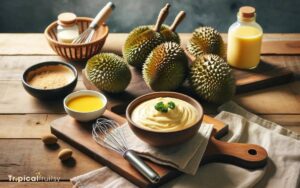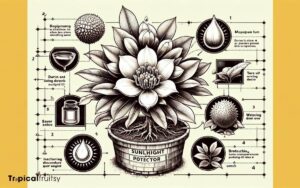Why Is Durian the King of Fruits? Revealing Royalty!
Durian is renowned as the ‘King of Fruits’ due to its unique combination of intense aroma, distinctive flavor, and rich nutritional profile.
A staple in Southeast Asia, it boasts a creamy texture and a taste that some describe as a blend of savory, sweet, and creamy flavors.
Its high content of vitamins, minerals, and antioxidants contributes to its status as a dietary staple with numerous health benefits. Durian’s significance also extends to cultural aspects, often representing luxury and social status.
The title ‘King of Fruits’ given to durian is attributed to several factors:
Durian’s distinctive sensory profile and nutritional benefits firmly establish it as the ‘King of Fruits.’

Key Takeaway
Characteristics and Uses of Durian: The King of Fruits
| Attribute | Description |
|---|---|
| Origin | Southeast Asia |
| Aroma | Intense and pungent |
| Flavor Profile | Sweet, savory, and creamy |
| Texture | Custard-like |
| Nutrients | Vitamin C, potassium, dietary fiber, antioxidants |
| Cultural Relevance | Symbol of wealth and luxury |
| Culinary Uses | Eaten fresh, pastries, ice cream, savory dishes |
The History of Durian
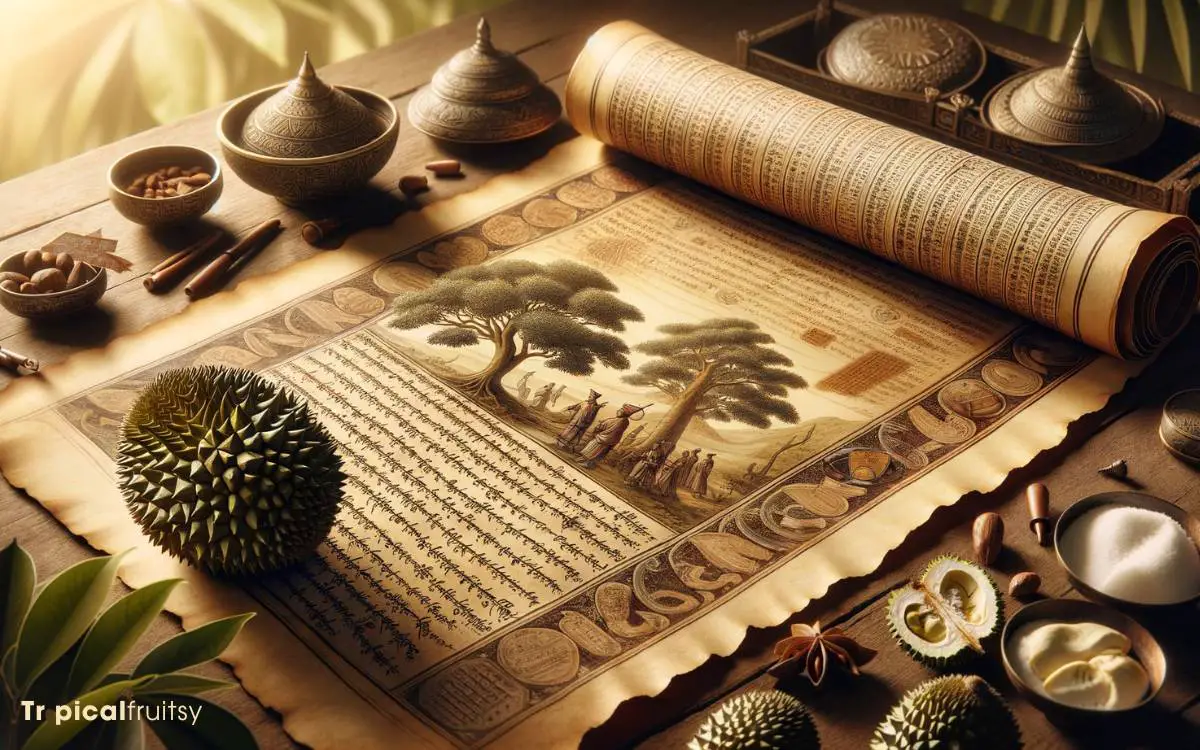
The history of durian stretches back several centuries, with its earliest documented references appearing in writings from the 16th century.
Esteemed in Southeast Asia for its unparalleled taste and nutritional value, durian has been celebrated in the region’s cultural practices and culinary traditions.
Known as the ‘King of Fruits’, durian’s historical prominence is deeply intertwined with the identity of places like Malaysia, Thailand, and Indonesia.
Through generations, the cultivation of durian has evolved, but the reverence for this majestic fruit remains undiminished. It epitomizes a natural marvel, festooned with a formidable spiky husk, concealing its rich and creamy treasure within.
This regal fruit not only captivates with its flavor but also with its unique aroma profile, which we will explore next.
Unique Aroma Profile
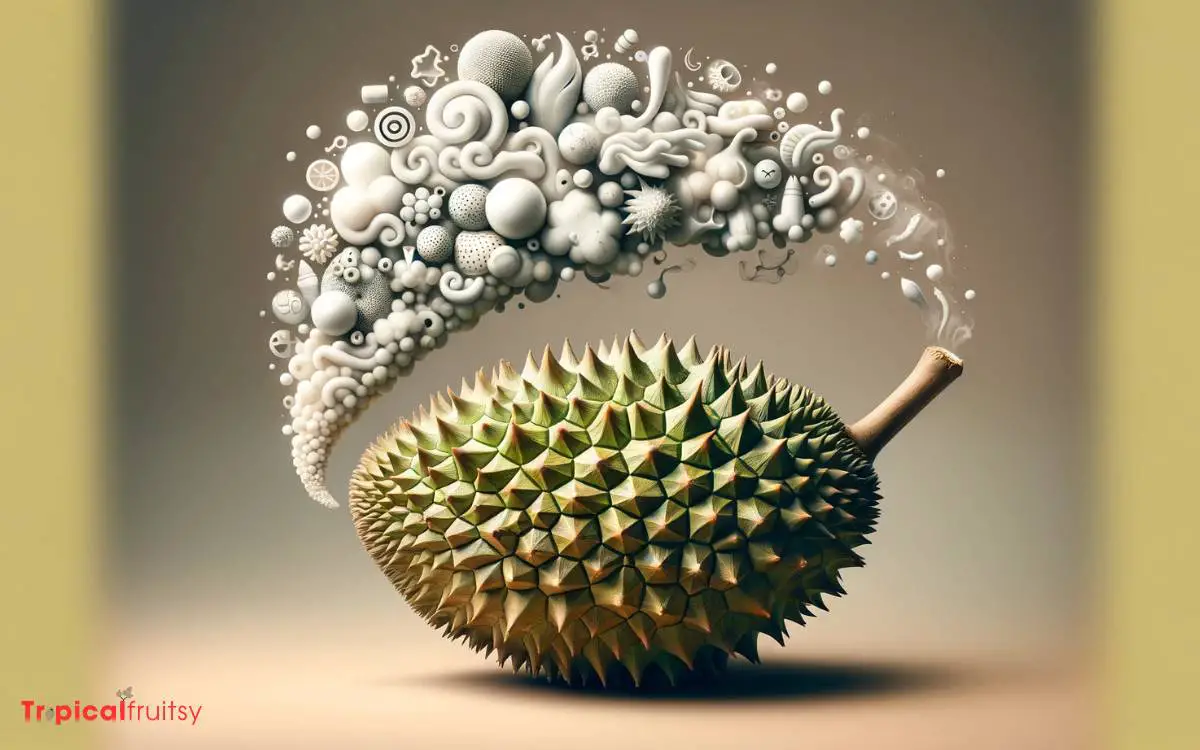
Durian’s distinctive olfactory signature is as notorious as it is complex, encompassing a wide spectrum of aromas that range from sweet almond-like scents to pungent notes often compared to onions or rotten eggs.
This multifaceted fragrance is a product of various volatile sulfur compounds, which are the result of the fruit’s unique ripening process.
Enthusiasts celebrate the aroma as an acquired indulgence, a prelude to the culinary adventure that awaits, while detractors find it overwhelmingly offensive, often likening it to a blend of foul-smelling waste materials.
The durian’s scent is so potent that it is banned in many public spaces across Southeast Asia.
This aromatic tapestry, a true marvel to the senses, seamlessly leads us to the durian’s rich flavor experience.
Rich Flavor Experience
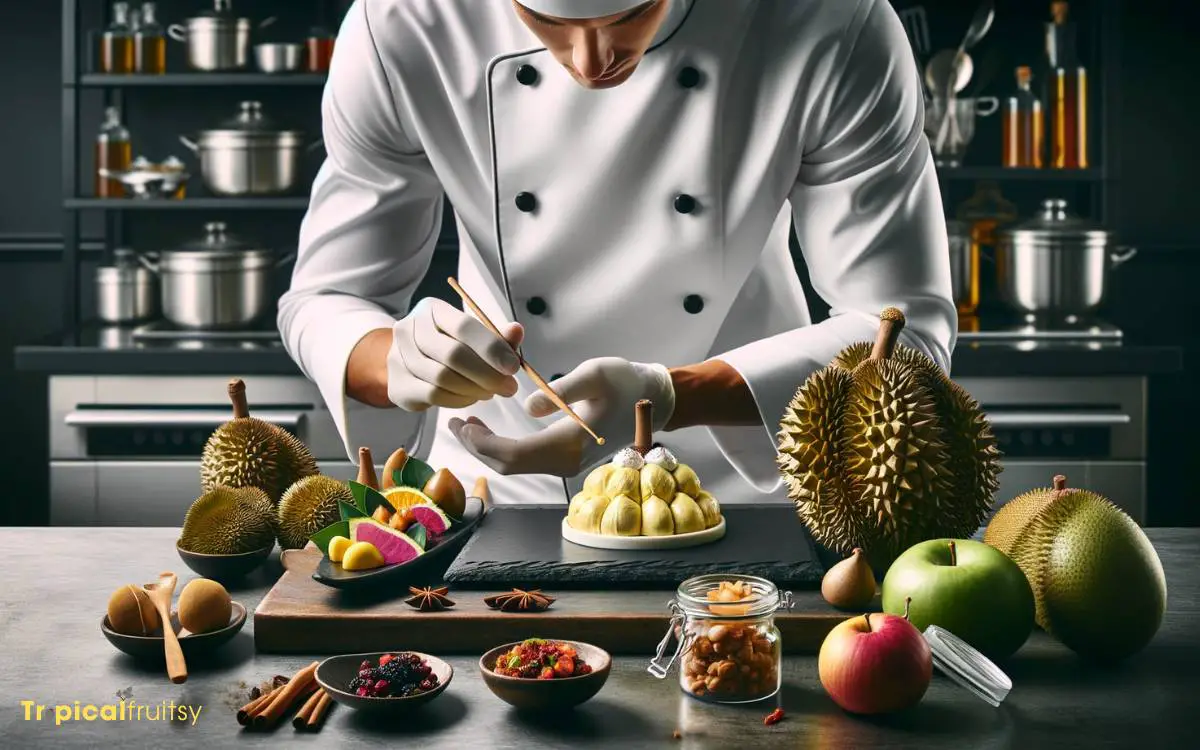
Beneath its formidable odor, durian offers a complex flavor profile that aficionados often describe as a rich amalgamation of sweet, creamy, and savory nuances.
This tropical delicacy’s flesh is creamy, often likened to a custard, and can exhibit a sweetness that evokes the essence of caramelized sugar.
Yet, it is the interplay of these dessert-like qualities with subtle hints of bitterness and a depth that can be compared to savory aged cheeses that truly sets durian apart.
Connoisseurs celebrate its multifaceted nature, claiming that each bite delivers a symphony of tastes that tantalizes the palate.
This intersection of diverse flavors is precisely why durian stands as the monarch of fruits, offering a culinary experience that is both sumptuously rich and bewilderingly complex.
Nutritional Powerhouse
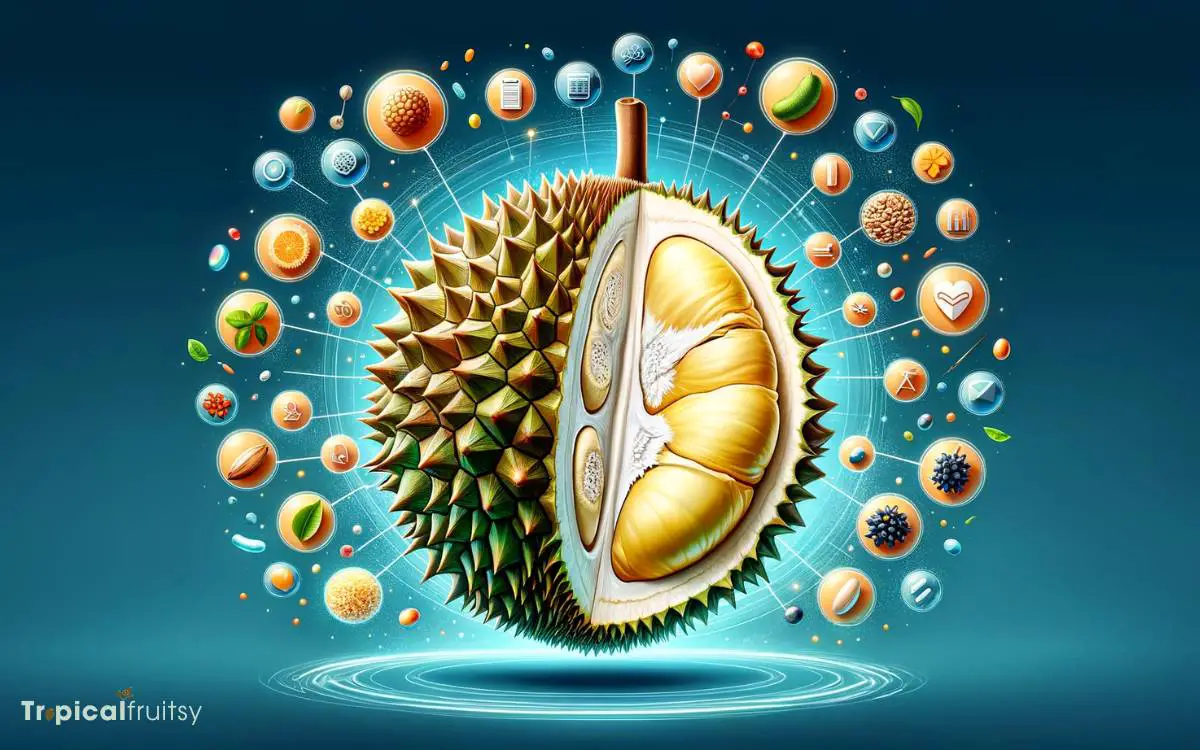
Beyond its polarizing aroma and taste, durian stands as a bastion of nutrition, teeming with a wealth of vitamins and minerals that fortify the body.
This formidable fruit not only provides a substantial energy boost with its high carbohydrate content but also offers a plethora of health benefits, including improved digestion, bolstered immunity, and enhanced skin health.
It’s this impressive nutritional profile that underpins durian’s regal title, offering compelling evidence of its dominance in the fruit kingdom.
Rich in Nutrients
Durian stands out as a nutritional powerhouse, packed with a diverse range of vitamins and minerals essential for optimal health.
Every bite delivers substantial amounts of vitamin C, bolstering the immune system, while B-vitamins like thiamin and niacin facilitate energy metabolism and proper nerve function.
Its rich content of dietary fiber aids digestion, and the presence of potassium supports heart health.
Not to be overlooked, durians contain antioxidants, which combat free radicals, reducing oxidative stress.
The unique fruit also offers a notable amount of healthy fats, rare for fruits, contributing to its creamy texture and further enhancing its nutritional profile.
As we delve into the myriad health benefits durians provide, one can’t help but appreciate its royal status among fruits.
Health Benefits Galore
The abundance of nutrients in durian translates into a multitude of health benefits. These benefits range from improved digestion to a strengthened immune system.
One of the key health benefits of durian is its high fiber content. This high fiber content aids in bowel regularity and can help reduce cholesterol levels.
Durian is also rich in vitamins, particularly vitamin C. This vitamin fortifies the body’s natural defenses, protecting against illnesses.
Potassium is another important nutrient found in durian. This nutrient is vital for maintaining healthy blood pressure levels.
In addition to vitamins and minerals, durian also contains B vitamins. These B vitamins support metabolic processes, enhancing energy production and mental clarity.
Durian is also packed with antioxidants. These antioxidants contribute to cellular health, warding off oxidative stress and inflammation.
Cultural Significance
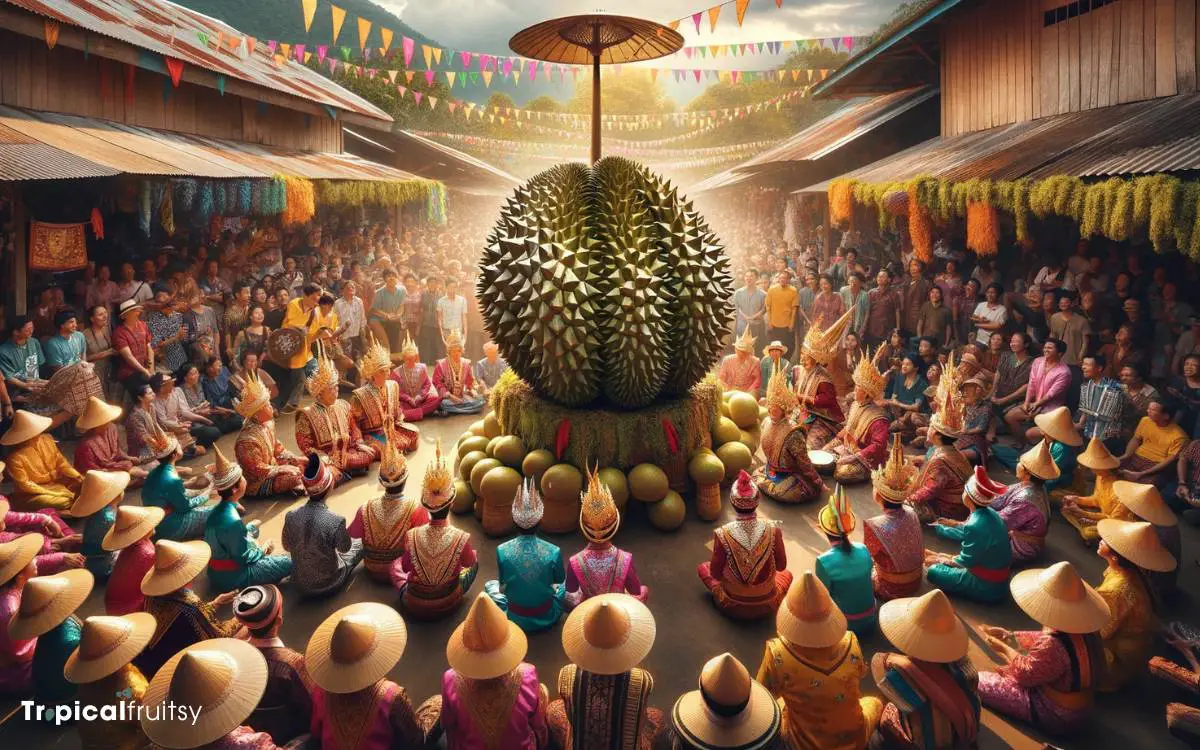
Durian holds a revered place in Southeast Asian culture. It symbolizes not just a fruit, but a heritage steeped in tradition and social importance.
It is the centerpiece of numerous festivals and celebrations, where communities unite in their shared affinity for its unique flavor and aroma.
The fruit’s association with status and prestige underscores its cultural resonance. It is often presented as a prized gift that conveys respect and honor.
Symbolic in Southeast Asia
We cannot overlook the profound cultural significance that durian holds across various Southeast Asian societies, where it is revered as a symbol of wealth, social status, and indulgent hospitality.
In these vibrant locales, the durian isn’t merely a fruit; it’s a culturally embedded icon, often playing a star role in social functions and festive celebrations.
The majestic aura surrounding its spiky husk and rich, creamy flesh is indicative of its elevated stature in the region’s collective consciousness.
Presenting durian to guests is seen as a generous act of sharing luxury, a testament to the host’s high regard for their company.
This deep-rooted reverence goes beyond the fruit’s distinctive taste and aroma, encapsulating a heritage that venerates the durian as a treasured emblem of Southeast Asian identity and tradition.
Festivals and Celebrations
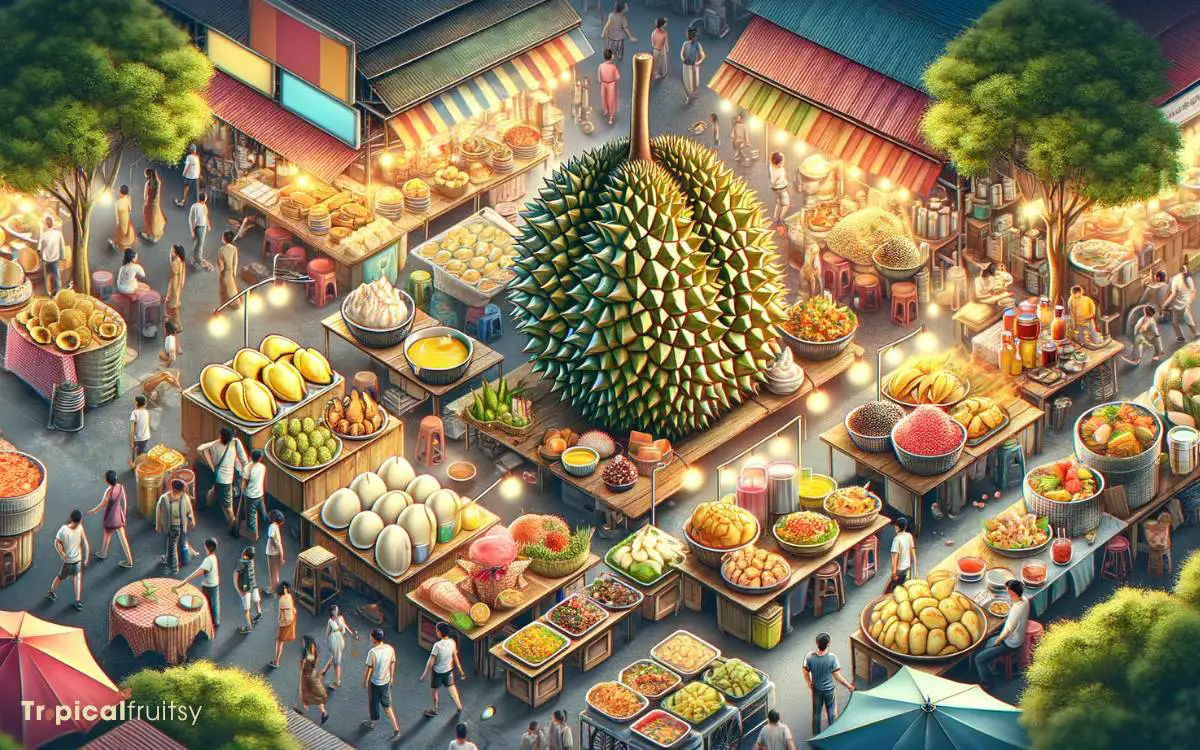
Celebrating cultural heritage, numerous festivals and celebrations across Southeast Asia prominently feature durian, highlighting its status as a prized delicacy and a symbol of prosperity.
These events provide a vibrant platform for honoring the storied fruit, with activities that deeply resonate with local and international enthusiasts alike:
- Durian Festivals: Dedicated events that celebrate the harvest with tastings, competitions, and cultural performances.
- Culinary Competitions: Chefs and amateurs alike create innovative dishes showcasing durian’s versatility.
- Agricultural Shows: Farmers exhibit the finest durian varieties, competing for top honors.
- Cultural Ceremonies: Traditional rituals that pay homage to the fruit’s significance in local communities.
This fervent celebration of the durian not only reflects the fruit’s cultural importance but also elevates its status and prestige within and beyond these vibrant communities.
Status and Prestige
Gaining prominence as a symbol of affluence and luxury, durian commands a unique position in Southeast Asian culture. It is often associated with social status and traditional prestige.
Esteemed for its rich taste, complex aroma, and rarity, the durian is not merely a fruit but a cultural icon.
Its hefty price tag and seasonal availability add to its exclusive allure, making it a coveted treat among connoisseurs and the upper echelons of society.
In many regions, possessing or gifting durians is perceived as an ostentatious display of wealth and generosity.
Celebrated through festivals and special occasions, the durian’s cultural significance is deeply ingrained. It transcends mere culinary appreciation and embodies the essence of opulence and prosperity within these communities.
Culinary Versatility

Durian’s culinary versatility extends beyond its contentious raw consumption, as chefs and food enthusiasts incorporate its unique flavor into an array of dishes.
This pungent fruit’s multifaceted nature allows for a remarkable transformation, creating both sweet and savory culinary masterpieces.
The creamy texture and complex taste profile have led to its inclusion in a variety of recipes:
- Durian Ice Cream: A creamy delight that tames the fruit’s intensity with cold sweetness.
- Durian Pancakes: Soft, fluffy pancakes enveloping a rich durian filling.
- Spicy Durian Curry: A bold dish that marries the fruit’s richness with robust spices.
- Durian Cheesecake: A decadent dessert combining the fruit’s creamy pulp with a classic cheesecake base.
Each dish showcases durian’s ability to elevate traditional flavors to exotic new heights, solidifying its royal status within the culinary world.
Global Durian Demand

Amidst its culinary adaptability, the global demand for durian is witnessing a significant surge, propelled by its esteemed title and growing international curiosity.
Enthusiasts and newcomers alike are drawn to its complex flavor profile and unique sensory experience. In Southeast Asia, durians are a symbol of prestige and are often the centerpiece of social gatherings.
Beyond its native region, this enigmatic fruit is making inroads into Western markets, where its presence is increasingly notable in specialty food stores and Asian supermarkets.
This burgeoning interest has sparked investments in durian cultivation and export, ensuring a steady supply to meet the climbing demand.
As the world continues to embrace the durian, the fruit’s nutritional benefits are also coming to the forefront, promising to enrich the global palate and diet.
Health Benefits Unveiled

Unveiling the health benefits of durian, researchers have identified a wealth of nutrients in this pungent fruit that contribute to its regal status.
Celebrated not just for its unique taste, durian is a powerhouse of health benefits that are as intriguing as its aroma. Each bite is packed with natural compounds promoting overall well-being.
- Rich in Fiber: Supports a healthy digestive system and may help in regulating blood sugar levels.
- High in Vitamin C: Bolsters the immune system, aiding in the prevention of illnesses and skin health enhancement.
- Potassium Abundance: Essential for maintaining proper heart function and balancing electrolytes.
- Antioxidant Properties: Contains antioxidants that fight free radicals, potentially reducing the risk of chronic diseases.
Understanding these benefits illuminates why durian is truly deserving of its majestic title.
The Durian Harvesting Process
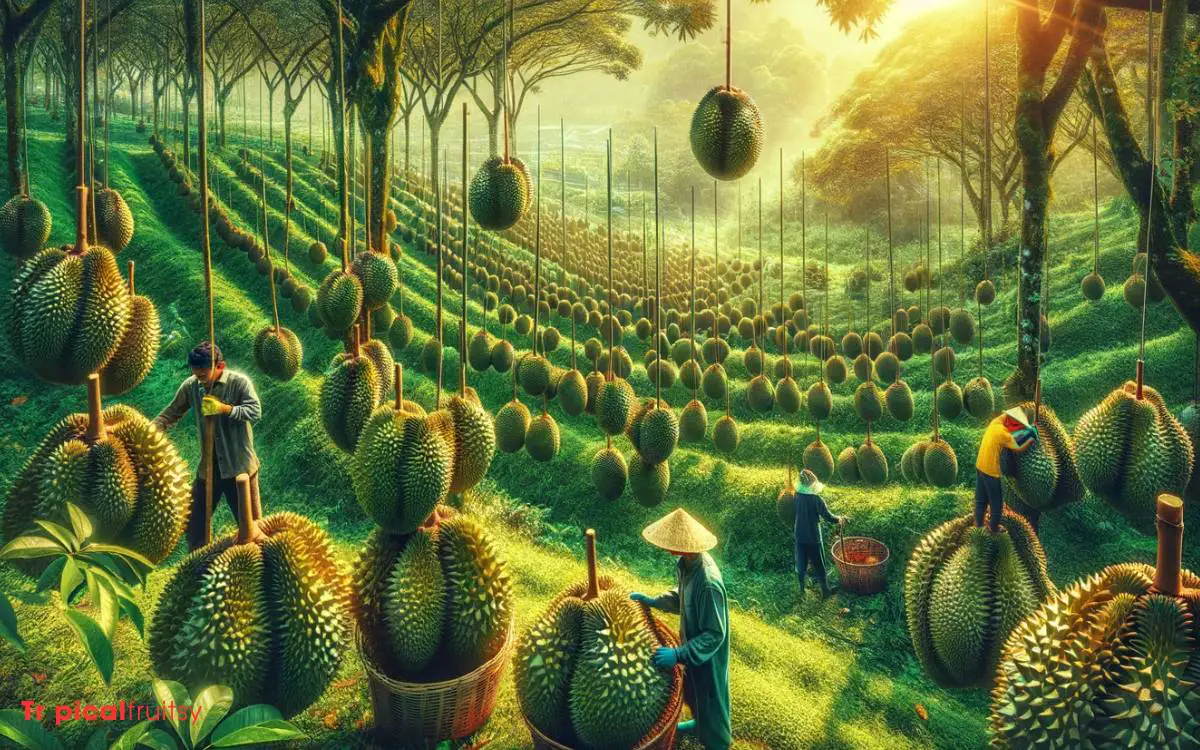
Beyond the health benefits of durian, the harvesting process is a meticulous operation that ensures the fruit’s optimal quality and flavor.
Durian trees tower majestically in the orchard, demanding the utmost skill and precision during harvest. Unlike many fruits, durian is unique, as it must fall naturally when ripe to preserve its delicate flesh and robust aroma.
Harvesters keenly observe the subtle changes in the fruit’s husk and employ careful timing to collect these thorny treasures at the peak of perfection.
Specialized nets or soft ground coverings cushion the durians’ descent, safeguarding their voluptuous interior from damage.
Each fruit is then gently inspected and deemed worthy of gracing tables, a testament to nature’s bounty and human dedication combined.
Why Is Durian Fruit Popular
Despite its notorious smell, durian fruit is incredibly popular, especially in Southeast Asia, where it’s hailed as the “King of Fruits.”
This popularity stems from several factors:
- Unique Flavor: Many people describe durian’s taste as rich, with a creamy texture that’s unlike any other fruit. It has a complex flavor profile that can include hints of almond, with a sweet and slightly savory taste that many find delightful.
- Nutritional Value: Durian is nutritionally dense, packed with vitamins (C, B-complex), minerals (potassium, magnesium), and dietary fiber. It also contains healthy fats and is a source of energy, making it a nutritious snack or dessert option.
- Cultural Significance: In many parts of Southeast Asia, durian holds cultural significance and is involved in various local traditions and social practices. It’s often a symbol of luxury and indulgence, with people going to great lengths to obtain and enjoy the best varieties.
- Culinary Versatility: Beyond being eaten fresh, durian is used in a wide range of culinary applications, from sweets and desserts (like ice cream, cakes, and candies) to savory dishes. Its rich taste enhances the flavor of these dishes, making it a beloved ingredient for many chefs and home cooks.
- Exclusivity and Seasonality: Durian season is highly anticipated, and the fruit’s availability can sometimes be limited, which makes it even more desirable. Certain varieties, such as the Malaysian “Musang King,” are particularly sought after and can fetch high prices, adding to the fruit’s allure.
- Social Experience: Eating durian is often a shared experience, bringing people together to enjoy the fruit’s unique taste and engage in the communal act of opening and consuming it. This social aspect can make eating durian a memorable and enjoyable event.
Despite the divisive opinions on its smell, these factors contribute to durian’s popularity and its revered status among many fruit lovers around the world.
Conclusion
The durian reigns supreme as the ‘king of fruits,’ revered for its rich history, distinctive aroma, and complex flavor.
Its nutritional profile enhances its regality, while cultural significance and culinary adaptability further cement its noble status. Rising global demand underscores its allure, with health benefits increasingly recognized.
The meticulous harvesting process ensures the fruit’s royal quality, making the durian a celebrated icon in the fruit kingdom, cherished by connoisseurs and cultures worldwide.

